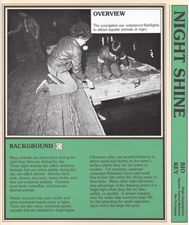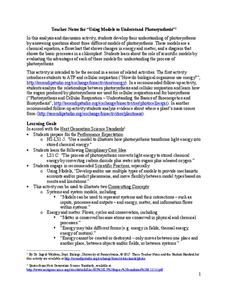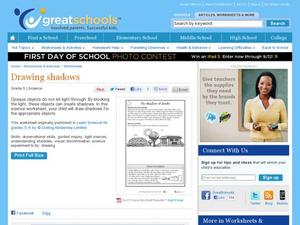Curated OER
The Color of Light
Students explore the components of light as a combination of several colors. The focus of the lesson reveals that objects are viewed in a certain color because that color is reflected off of the object.
Curated OER
What is Science?
Students explore physical science by conducting a plant experiment. In this scientific method lesson plan, students discuss questions scientists ask in order to properly explore certain subjects. Students utilize two plants and place one...
Curated OER
Miscellaneous Light Topics
In this light topics science instructional activity, students read selections about fiber optics, fluorescent light, incandescent light, total internal reflection, polarization, glow-in-the-dark light, and lasers. Students then respond...
Curated OER
Night Shine
Students explore aquatic animals that are attracted to light. In this science lesson, students observe how aquatic animals respond to light at night. Students search for aquatic animals in the dark and attempt to catch them. Students...
Curated OER
Black & White Drama
Students explore Ansel Adams's dramatic black and white mountain landscape photographs. They identify common geographic elements and animals indigenous to the Sierra Nevada and create original art in black and white to depict light and...
Curated OER
Light, Colors, and Vision
Third graders experience optic illusions by creating flipbooks. In this optics lesson, 3rd graders view a demonstration of the workings of rods and cones using a camera. They are shown an optical illusion and work to create their own...
Curated OER
Fish Tank Optics- Learning How Light Travels
Students explore light waves, refraction, and reflection. In this light activity, students observe how light moves by using a flashlight. Students observe refraction and reflection.
South Penquite Farms
Measuring Soil Temperatures
Using an auger, start-up soil scientists bore a core of soil. They examine the sample and record the temperature at three depths in the borehole. This is an attractive activity sheet that succinctly guides your earth science class...
Center Science Education
Looking Into Surface Albedo
How does the color of a surface affect the heating of the earth? Middle school science classes experiment with color and surface albedo to determine the relationship. The website has tabs for an overview, teacher's instructions,...
NOAA
Methane Hydrates – What's the Big Deal?
Have you ever tried to light ice on fire? With methane hydrate, you can do exactly that. The ice forms with methane inside so it looks like ice, but is able to burn. The lesson plan uses group research and a hands-on activity to help...
Serendip
Using Models to Understand Photosynthesis
Is your class in the dark about photosynthesis? Shed some sunlight on an important biological process with a thoughtful activity. After answering questions to help determine their level of knowledge, learners work with chemical equations...
Howard Hughes Medical Institute
Understanding Variation
Does where we live influence how our bodies express genetic traits? Explore variation in human skin color with an activity that incorporate video and hands-on learning. Individuals model the relationship between phenotypes and genotypes,...
Curated OER
The Radish Experiment
First graders grow radishes. In this Science instructional activity, 1st graders observe the growth of radishes in both the light and dark. Students discuss what plants need to live.
Curated OER
Reading in the Dark
Students explore the possible link between nearsightedness and reading in low light.
101 Questions
Double Sunglasses
If you wear two sets of sunglasses, do you get twice the darkness? Pupils explore an enlightening topic using a video and math model. They discover how to extend the topic through a sequel video and challenge question.
Curated OER
Blueprint Paper
High schoolers investigate chemical reactions involved in making a blueprint. In this blueprint paper lesson plan, students expose blueprint paper with writing that has been soaked in a solution of potassium ferricyanide and iron (III)...
Curated OER
What is Light?
Students explore different types of light, and demonstrate reading comprehension skills, including reading strategies, inference, literal meaning, and critical analysis.
Curated OER
Light and Shadows
Students participate in an online lesson to determine how light travels from a source, and to explain that shadows form when light travelling from a source is blocked.
Curated OER
No Shadow of Doubt
Fifth graders must use a pencil to draw in the shadows they think will be formed by a house, a greenhouse, and a tree. The sun is behind each of these objects, and an open field is in front of them. That's where pupils draw their...
Curated OER
Day and Night
Expand your third graders' universe with a science activity about Earth's rotation. They read a short explanation about the direction of sunlight, then draw an arrow to indicate which way the sun is pointed at an illustration of the...
University of Colorado
Rings and Things
Galileo first observed Saturn's rings in 1610. Through the use of a flashlight and baby powder, classes see how they can observe the rings of the outer planets from far away. Another demonstration shows how these rings, made of ice and...
ARKive
Nocturnal Animals
How do those nocturnal animals see in the dark? This perplexing question does have an answer. First, little ones use their sense of touch to determine the name of a mystery object, then they listen closely to identify various animals by...
American Museum of Natural History
They Glow!
Would you believe marine animals can make their own light? An online resource describes the process of bioluminescence and how animals in the ocean use it to survive. The lesson features a catchy tune that describes the behavior of ocean...
American Museum of Natural History
They Glow!
Let there be light! An interactive online lesson describes the process of bioluminescence and how ocean species use it to their advantage. The lesson highlights several specific species as well as provides vocabulary support with...























